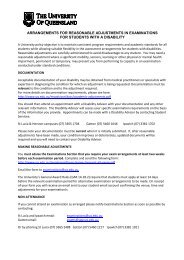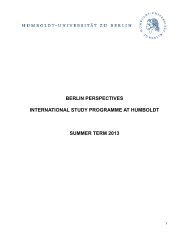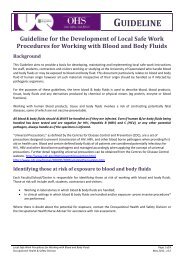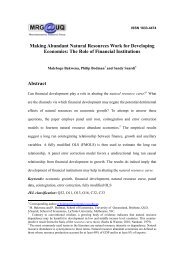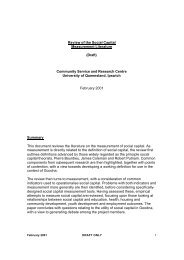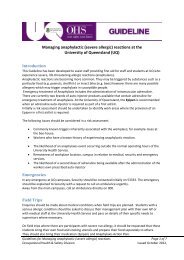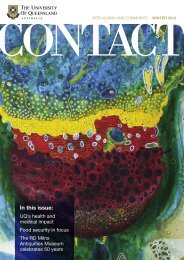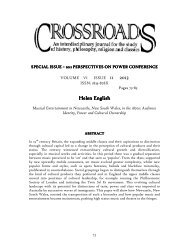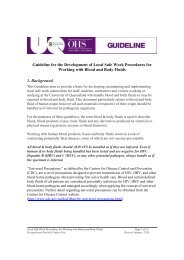some mysterious activity <strong>of</strong> willing or judgment. We don’t devote whole days to willing or judgment. Even so,these are capacities <strong>of</strong> our minds <strong>and</strong> it is therefore a mistake to think them away.What then is judgment? Imagine that I have been appointed the judge <strong>of</strong> a competition. One afternoon I sit downto make a judgment. You ask me what I am doing, <strong>and</strong> I say, ‘Making a judgment’. But to say this is not to tellyou what ‘I am doing but what I am to do – what I shall have done when the work judgment requires iscomplete.’ lviii After having been willing to think long <strong>and</strong> hard about the various entries to the competition, theirrelative strengths <strong>and</strong> weaknesses <strong>and</strong> so on, I take the plunge, make a judgment, <strong>and</strong> declare that one <strong>of</strong> theentries is the winner. <strong>Thinking</strong> takes time, but willing <strong>and</strong> judgment occur in a flash. lix Even so, we must bewilling to judge thoughtfully.To say that judgment (unlike thinking) is not an activity <strong>and</strong> that it occurs (again, unlike thinking) in a flash, canbe misleading if we do not differentiate judging from judgment. <strong>Judging</strong> is a state <strong>of</strong> coming to a judgment,whereas to have judged is to have made a judgment. <strong>Judging</strong> is <strong>of</strong>ten accompanied or preceded by the activity <strong>of</strong>thinking, in particular by representative or enlarged thinking. This explains why, in her discussion <strong>of</strong> judgment,Arendt talks about an enlarged way <strong>of</strong> thinking which is ‘active in judging.’ lx To think in an enlarged way, or tothink representatively, is to think about the matter we are trying to reach judgment on from the perspective <strong>of</strong> acommunity <strong>of</strong> fellow judgers. Having undertaken such thinking we are <strong>of</strong>ten better placed to make a goodjudgment, the sort <strong>of</strong> judgment that we expect others to agree with. Judgment is thus a way <strong>of</strong> ‘sharing-theworld-with-others,’<strong>of</strong> seeing the world from the perspective <strong>of</strong> common sense (a sensing <strong>of</strong> the world that iscommon to all, a shared world) that transcends our five private senses, <strong>and</strong> is thus one <strong>of</strong> our ‘fundamentalabilities’ as political beings. lxi But thinking, even representative thinking, cannot take the place <strong>of</strong> judgment,since even after I have thought long <strong>and</strong> hard about a matter, I still have the work <strong>of</strong> judgment ahead <strong>of</strong> me.However, we don’t always have the time to stop <strong>and</strong> think before we judge; sometimes we must, while on therun, make a judgment straight away. But even in these cases judgment is never a matter <strong>of</strong> simply leaping to aconclusion. As Deutscher notes, the judge who declares his judgment as a result <strong>of</strong> sheer prejudice, rather thanas a result <strong>of</strong> weighing the evidence (however poorly), has not made a bad judgment but has failed to judge atall. lxii Such a judge pre-judges the case; he leaps straight to a conclusion rather than makes a judgment. To seewhy, consider another case. Deutscher gives the example <strong>of</strong> a runner who, ‘[h]aving no time to pause <strong>and</strong>consider,’ must ‘judge (‘on the run’) whether she can ‘clear an obstacle in a leap.’ lxiii While there is no time forthe runner to thoughtfully consider the matter, she must still judge. ‘To just leap would be to abdicate fromjudgment.’ lxiv The person <strong>of</strong> prejudice just leaps straight to a conclusion, <strong>and</strong> just leaping is not even judging onthe run. To judge is not to guess or blindly leap, but to bring our thought, knowledge, skills <strong>and</strong> experience tobear upon the matter. lxvDrawing on this account Deutscher attempts to deal with the much discussed problem <strong>of</strong> the actor-spectator splitin Arendt’s account (or accounts) <strong>of</strong> judgment. lxvi This problem seems to arise since Arendt develops twoaccounts <strong>of</strong> judgment, one from the perspective <strong>of</strong> the engaged actor who wants to work out what to do, <strong>and</strong>another from the perspective <strong>of</strong> the disengaged spectator who plays no part in the action at h<strong>and</strong> <strong>and</strong> who wantsto weave facts into a meaningful story. But it is not clear that these two accounts sit comfortably together. Therethus seems to be a schism between actor <strong>and</strong> spectator judgment which threatens to undermine the overallcoherency <strong>of</strong> Arendt’s account.We can see how Deutscher deals with this problem by drawing on the examples <strong>of</strong> judging on the run <strong>and</strong>judging a competition. In the first case the runner is in the thick <strong>of</strong> things <strong>and</strong> has no time to thoughtfullyconsider her options before she jumps. This looks like actor-judging. In the second case the competition judgehas plenty <strong>of</strong> time to thoughtfully consider the various entries (none <strong>of</strong> which belong to her) before she comes toa judgment. This looks like spectator-judging. On this point Deutscher writes:Arendt maintains, nevertheless, that we take up a temporary role as spectator when we go to will <strong>and</strong>judge. Her idea is that judging requires a use <strong>of</strong> the spectator’s point <strong>of</strong> view, not that judging is lockedinto it. Critics fail to recognise that her ‘spectator’ is only partially <strong>and</strong> temporarily separated from the[actor’s] playing field. lxviiThere is thus no rupture between the actor <strong>and</strong> the spectator. The runner is a partial <strong>and</strong> involved actor who,while on the run, taps into the spectator’s perspective in order to judge whether or not she can clear the obstaclein a single bound. Although some spectators may make more permanent <strong>and</strong> long-term departures from theactor’s playing field, they need not do so in order to be spectators. The same person might be judgingcompetitions one moment, like a spectator, <strong>and</strong> judging leaps the next, like an actor. Further, spectators are <strong>of</strong>tennot disinterested as they battle with others over the meaning <strong>of</strong> past events. But to the extent that such spectators60
are interested parties engaged in history wars they are also actors trying to make past events meaningful in aparticular way. Just as we can be spectators while playing on the actor’s field, we can also be actors whilesitting on the spectator’s bench.However, while Deutscher is right to reject any attempt to overplay the actor-spectator distinction, it is equallyimportant not to, as Deutscher risks doing, underplay it. Arendt highlights different features <strong>of</strong> actor <strong>and</strong>spectator judgments (these different features should be read as common, but hardly necessary or exclusive,characteristics). lxviii For Arendt, the actor (<strong>and</strong> here Arendt means specifically the political actor, a personworking out how to share the world with others) deliberates about what they will do <strong>and</strong> this makes them partial,interested, involved, concerned with gaining doxa or fame, <strong>and</strong> subject to the st<strong>and</strong>ards set by spectators. lxix Incontrast to the actor, the spectator (<strong>and</strong> here Arendt means specifically the historian, storyteller, novelist, poet,playwright, philosopher <strong>and</strong> so on) deliberates, not about what they are to do, but about the meaning <strong>of</strong> pastactions, <strong>and</strong> this makes them impartial, disinterested, uninvolved, concerned with conferring <strong>and</strong> not gainingfame, <strong>and</strong> the setters <strong>of</strong> the st<strong>and</strong>ards by which actors are to be judged. lxxFurther, actor <strong>and</strong> spectator judgments differ not only in the ways that Arendt highlights above, but also in terms<strong>of</strong> the different roles that Arendt sees them as playing. Actor-judgment has the role <strong>of</strong> doing the political heavylifting<strong>of</strong> justifying political values, principles <strong>and</strong> decisions. Spectator-judgment has the role <strong>of</strong> doing theexistential heavy-lifting <strong>of</strong> making our being in the world a meaningful <strong>and</strong> worthwhile activity. It is the actorwho, under the guidance <strong>of</strong> forward-looking judgment, performs meaningful actions <strong>and</strong> makes decisions aboutwhat to do. It is the spectator who, under the guidance <strong>of</strong> backward–looking judgment, makes those actionsmeaningful by making judgments about them, revealing their purpose <strong>and</strong> meaning, <strong>and</strong> thereby reconcilingboth actors <strong>and</strong> spectators alike to the way the world is. lxxi These two accounts are not in tension since they arenot even in competition. Each account simply reveals a different role for, or type <strong>of</strong>, judgment. One type <strong>of</strong>judgment is more forward-looking <strong>and</strong> the other more backward-looking. One type is more political, <strong>and</strong> theother is more existential, <strong>and</strong> so on. However, while Deutscher helps us to underst<strong>and</strong> the similarities betweenthese two types <strong>of</strong> judgments, we should not overlook the differences either.AFTER-THOUGHTSThe problem with a thoughtful book, such as Judgment After Arendt, is that it tends to raises more questionsthan it definitively answers. We have investigated some <strong>of</strong> these questions here. In particular, we havechallenged the claim that Eichmann did not think, even though he was a thoughtless person. With regard towilling, we examined the tension inherent in the idea <strong>of</strong> ‘being willing’, a tension that arises because this statecan be understood as going-to-do-something <strong>and</strong> going-to-do-it-willingly. We saw that in difficult moral casesthese can come apart. In such cases we need a firm will, even if this is accompanied by some reluctance. Finally,in regard to judgment, while following Deutscher’s lead in bringing actor <strong>and</strong> spectator judgment closertogether, we also cautioned against ignoring the differences between these two different types <strong>of</strong> judgments. Nodoubt there will be some problems with the arguments defended here. Further, there are also many importantissues that Deutscher examines in his rich book that we have not been able to think about here at all. And so theconversation, <strong>and</strong> the thinking, must go on <strong>and</strong> on.REFERENCESi Max Deutscher, Judgment after Arendt (Aldershot, Hampshire: Ashgate, 2007) xvi.ii The last book on judging, due to Arendt’s death, was never actually written, although we have some lecturesthat she delivered on judgment as well as material scattered throughout her published <strong>and</strong> unpublished writings.See, for example, Hannah Arendt, Between Past <strong>and</strong> Future: Eight Exercises in Political Thought (New York:Viking Press, 1968), Hannah Arendt, Eichmann in Jerusalem: A Report on the Banality <strong>of</strong> Evil (New York:Penguin Books, 1965), Hannah Arendt, The Human Condition (Chicago: The <strong>University</strong> <strong>of</strong> Chicago Press,1958), Hannah Arendt, Lectures on Kant's Political Philosophy, ed. Ronald Beiner (Brighton: The HarvesterPress, 1982).iiiA reviewer <strong>of</strong> Deutscher’s first book, Subjecting <strong>and</strong> Objecting, ungenerously calls this method one <strong>of</strong>‘ignoring the literature’ – see T S Champlin, "Review <strong>of</strong> Subjecting <strong>and</strong> Objecting by Max Deutscher,"Philosophy 60, No. 231 (1985): 140.iv See Ronald Beiner, "Hannah Arendt on <strong>Judging</strong>," in Lectures on Kant's Political Philosophy, ed. RonaldBeiner (Brighton: The Harvester Press, 1982).61


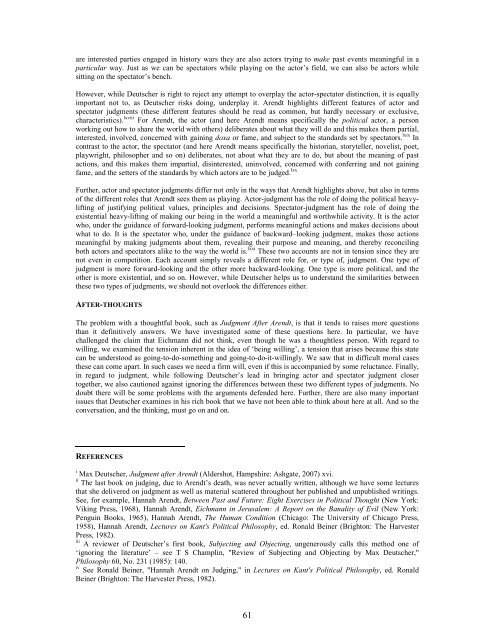
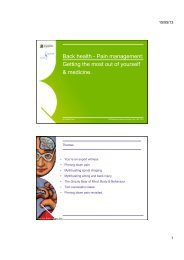
![Recycling [ PDF, 62KB ] - University of Queensland](https://img.yumpu.com/51805185/1/184x260/recycling-pdf-62kb-university-of-queensland.jpg?quality=85)
